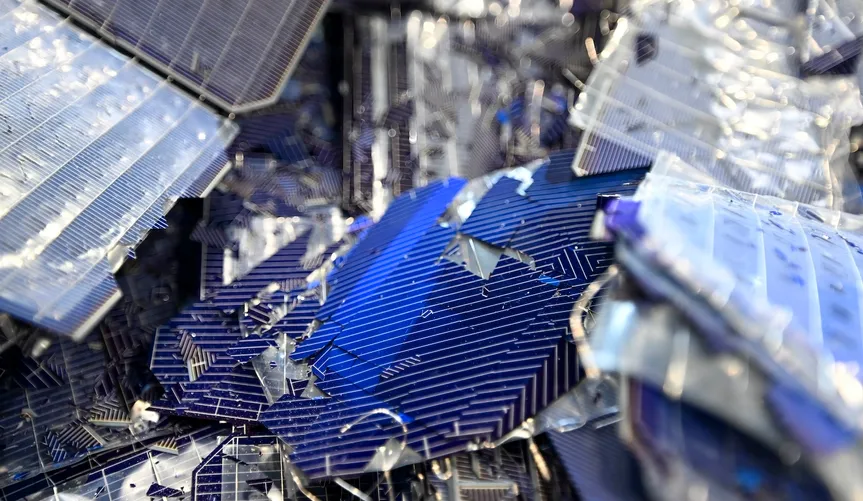
Each time a hurricane batters Florida, the country’s second-largest market for solar energy, broken panels pile up in landfills.
OnePlanet Solar Recycling has a plan to tackle that problem. The Jacksonville, Florida-based startup, led by a former steel executive who worked on the industry’s efforts to reuse scrap, just raised $7 million to start developing a first-of-its-kind solar recycling plant. The facility would break down busted panels and turn the waste stream into a new domestic source of metals such as copper and aluminum at a moment when tariffs are set to hike the price of imported materials.
The company plans to build its $90 million facility, dubbed the River City project, in Green Cove Springs — just south of Jacksonville, Florida’s most populous city. In 2027, OnePlanet aims to complete the first of three phases of construction on the plant and open the debut disassembly line capable of deconstructing 2 million solar modules per year. The firm set a deadline to triple capacity to 6 million panels by 2030.
At peak output, the company expects the facility to be among the largest solar recycling plants in the nation.
OnePlanet’s ambitious plans rest on its unique solar recycling process. The company uses existing technologies but developed a proprietary workflow for divvying panels by shape, model, and physical integrity before crushing, grinding, and chemically treating the hardware to extract raw materials.
“We’re doing a lot of work before we actually feed the panels into the recycling line,” said André Pujadas, OnePlanet’s chief executive. “We batch panels together so we can run campaigns to extract different types of materials, thereby optimizing the process and optimizing production and efficiency.”
Employing artificial intelligence and state-of-the-art sensors, OnePlanet can recover not just the panels’ glass, plastic, and silicon but up to 97% of metal concentrates of aluminum and copper, Pujadas said.
“You can recover the glass and still leave a fairly large amount of impurities in the remaining elements that complicate any further separation process,” he said. “That increases costs for recycling; then you don’t have as pure a product.”
Pujadas previously worked at the steelmaker Nucor, which led the U.S. industry’s adoption of electric arc furnaces. The technology turns scrap metal into new steel using electricity, offering a lower-carbon alternative to fresh steel generated from iron ore in a coal-based blast furnace. That experience taught Pujadas about where costs can mount in a supply chain and how much value a firm can create by freeing feedstock from contaminants.
Compared to that of other recyclers, OnePlanet’s approach will save the company money on maintenance since the pre-disassembly separation process avoids unnecessary wear on the machines, he said, basing the claims on the success of the firm’s pilot plant in Jacksonville.
The financing round announced Tuesday will “be used for final engineering, environmental permits, master recycling agreements, and long–lead time items,” Pujadas said.
The funding “reflects our belief that solar module recycling is not only necessary — it is investable at scale, with durable tailwinds driven by regulation, economics, and resource security,” Ashlynn Horras, partner at the climate-focused venture firm Khasma Capital, said in a statement. Khasma Capital led OnePlanet’s recent seed round.
Among the biggest challenges for recycling is finding cheap methods to transport panels to the processing facility. Shipping busted equipment from Texas, Pujadas said, is more expensive than hauling in panels from Puerto Rico. The location near Jacksonville not only has access to a Class I railroad and a port, he said, but to a lot of local material from within the state itself.
OnePlanet is also getting some help from the Inflation Reduction Act. The company’s facility will be funded in part by a $14.5 million investment from the Department of Energy’s competitive 48C tax credit awarded last year.
Pujadas said “the jury is still out” on whether President Donald Trump and the Republican-controlled Congress will revoke the program.
“At the end of the day, I’m happy for the vote of confidence from the Department of Energy that this project presented some level of viability and can have a positive effect on domestic value chains,” he said. “Whether or not 48C comes to fruition or not, it’s not going to prevent us from continuing with the River City project.”
While he said tariffs may negatively impact the broader economy, the trade levies are expected to raise the price of key raw materials like aluminum, copper, and silicon, for which OnePlanet can offer a new domestic source.
“There’s a lot of unknowns on the tariff side,” Pujadas said. “But overall if there’s upward pricing pressure, the aluminum we produce will go up, the silicon will go up, and the copper will go up.”
A correction was made on April 22, 2025: The final quote in this piece initially read “the aluminum we procure will go up,” when it should have read “the aluminum we produce will go up.”